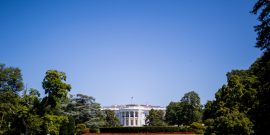Executive privilege should be reserved for the most compelling reasons, but in the absence of Congressional pressure, the power will be abused.
The Theory and Practice of Toleration
 In a famous letter to the Hebrew Congregation in Newport, Rhode Island, President Washington wrote:
In a famous letter to the Hebrew Congregation in Newport, Rhode Island, President Washington wrote:
It is now no more that toleration is spoken of as if it were the indulgence of one class of people that another enjoyed the exercise of their inherent natural rights, for, happily, the Government of the United States, which gives to bigotry no sanction, to persecution no assistance, requires only that they who live under its protection should demean themselves as good citizens in giving it on all occasions their effectual support.
That passage comes to mind as we ponder the recent Chick-Fil-A protests and counter-protests. Washington celebrated America for moving beyond mere “toleration.” The United States welcomed congregants of all faiths, so long as they “demean themselves as good citizens.” The Chick-Fil-A controversy reminds us of how difficult, and how special, religious toleration is.
The two sides in the Chick-Fil-A protests represented two models of toleration. For the sake of simplicity we can say that one side regards toleration as an idea–if you believe x you are tolerant and open minded, and if you do not, you are not. The other side regards it primarily as a practice–believe whatever you want, but don’t discriminate in hiring and firing, or in public accommodation.
The former position is well represented by the Mayors of Boston and Chicago, and some other public officials. In light of comments by the President of Chick-Fil-A indicating that he “supports traditional marriage,” and, implicitly, opposes gay marriage, and his financial support for groups that promote his view, several public officials wished to cast him, and his company out of decent society, and keep Chick-Fil-A out of their cities.
It soon became evident that such action would be constitutionally problematic.
One of Chicago’s Aldermen is still seeking to keep Chick-Fil-A out of his Ward.
These men hold that religious men and women who support the natural law teaching about marriage are free to believe whatever they choose in private, but they have no right to express those views in public, or to contribute to groups that support those views. Public support for such intolerant views puts them beyond the pale. Businessmen who uphold such views should not be free to open businesses in Chicago or Boston, unless they keep their mouth’s shut, and don’t contribute to groups that support their view. Under current constitutional doctrine the First Amendment prevents public officials from taking such action, they are left only to protest, as Mayor Emmanuel of Chicago did, that “Chick-fil-A’s values are not Chicago’s values.” (Since we have a “living constitution,” however, constitutional doctrine is always subject to change or reinterpretation).
For the time being, Orthodox Jews, or Catholics, or Evangelical Christians, or Muslims, are free to believe whatever they choose about marriage, and Mayor Emannuel will tolerate them, and they are free to open businesses in Chicago.
This toleration implies a moral judgment against all who disagree with the state-sponsored belief. Drawing an analogy with the civil rights struggle, the Mayors of Chicago and Boston see the cause of gay marriage as another case of the forces of toleration against the forces of backwardness and hate. They have zero tolerance for the other side’s views. Presumably, they believe that the public schools may teach that homosexuality is perfectly natural, even instinctive for a certain percentage of the population. That view, they claim, is secular and scientific. By contrast, the other view is religious, and, therefore, may only be taught in private. (But if modern science studies only facts, not values, one wonders on what basis one can claim any ethical position is not, ultimately, based upon something other than reason).
Reading some of this side’s writings, one even suspects that many of them, in fact, hate Orthodox Jews, Muslims, and traditional Christians, or, at least, they hate what they teach with regard to marriage. To be sure, even the most ardent supporters of gay marriage think that Orthodox Jews can, like the Nazis in Skoki, Illinois, parade their views in public, but, they think, no respectable person should associate with them, or support their businesses.
The other side does not buy the analogy between the effort to repeal Jim Crow and the effort to change the definition of marriage. After all such race codes were an innovation of the late 19th century, building upon the legacy of slavery and the modern invention of scientific racism. In early colonial Virginia, the Anglican Church, following the classic natural law teaching, sanctioned inter-racial marriage. Race being of no significance in the eyes of God, the Church saw no reason to prevent inter-racial coupling. Blocking inter-racial marriage was the innovation. Ultimately, it would gain the sanction of modern science, at least according to those who used science to invent modern scientific racism.
The effort to allow same-sex marriage represents the repudiation of longstanding religious teaching in all, or almost all of the world’s religions. To be sure, the definition of marriage has changed over time, but it has always involved both men and women. When part of the population, in the name of openness, toleration, equality, and fairness, wishes to change that, and at the same time, a substantial portion of the population continues to adhere to the classic teaching, cultural tensions will rise. But if the Progressive teaching becomes official dogma, it might make it difficult for the U.S. to remain a land of toleration, and a land that welcomes religious minorities who are fleeing persecution.
Nowadays this side embraces Washington’s position more fully than do its opponents, at least in this case. Note Washington’s comment that “no more that toleration is spoken of as if it were the indulgence of one class of people that another.” Washington’s view rejected the idea that we should shun people for their religious beliefs, tolerating them like we tolerate an annoying cousin at Thanksgiving dinner. On the contrary, he welcomed religious people to America. As he proclaimed in his Farewell Address: “And let us with caution indulge the supposition that morality can be maintained without religion. Whatever may be conceded to the influence of refined education on minds of peculiar structure, reason and experience both forbid us to expect that National morality can prevail in exclusion of religious principle.” Washington did not tell Jews to check their moral opinions at the door, before they were allowed into the country.
From this perspective, the toleration of competing and irreconcilable beliefs is inevitable, and may serve the public good. In this view, toleration is primarily the practice of admitting that one might be wrong, and, therefore, allowing respect for dissenting views. When there are serious moral disagreements, the challenge is to keep the shouting that such diversity of opinion causes to a low roar. That is not easy. According to opinion polls, opinion in the United States is divided roughly evenly on the issue. (It is true that gay marriage has been defeated whenever it has been put to a public vote, but it is also true that the margins have been getting smaller.) Given the diversity of opinion in the United States on this issue, and given the reality that in a democratic republic the government should reflect the will of the people, the job of the government is to be neutral in cases like this.
If orthodox religion is not going away, that is the only model of toleration that has a chance of producing civic peace. If toleration implies a moral judgment against religious women and men, it will not produce peace so long as traditional religion is with us. Jefferson, of course, thought that religious liberty would kill orthodoxy. When Connecticut repealed its establishment, he wrote, “I trust there is not a young man now living in the United States who will not die a Unitarian.” But he was wrong. Trinitarianism, along with Orthodox Judaism, and other traditional religions are still very much with us. That being the case, it might be that Washington’s model of toleration is the only one that can produce civic peace, and the only one that truly respects religious liberty.


